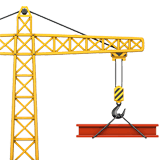
Unskilled jobs in Europe for foreigners with visa sponsorship in 2025
Various European countries are nowadays opening their doors to international workers, recognising the valuable contributions they can make in sectors facing labor shortages. This article will tell you everything you need to know about getting a job as an unskilled worker.
In an increasingly globalised world, the prospect of working abroad has become an appealing option for many individuals seeking new opportunities and experiences. For foreigners, finding unskilled jobs with visa sponsorship in Europe can be a viable pathway to move to Europe. In 2022, Ukraine was the leading source of immigrants to Europe, with 268,878 arrivals. Despite many having educational qualifications, the circumstances driving their migration often necessitate seeking unskilled jobs, at least initially.
How can unskilled workers come to work in Europe in 2025?
We'll start our exploration by analyzing how the visa for unskilled labor works, but first, let's take a look at immigration statistics in Europe.
Finding direct statistics on unskilled jobs can be challenging since these positions span across multiple industries. Therefore, we’ll look at broader immigration statistics related to work in Europe, which includes both skilled and unskilled jobs.

Statistics say
According to Eurostat, in 2022, the top ten countries from which people migrated to Europe for work were Ukraine, Belarus, India, Morocco, Türkiye, Brazil, Russia, Serbia, Nepal, and the Philippines. Individuals from other countries also migrate due to various economic reasons. Often, regardless of their qualifications, expats initially take on unskilled jobs as they settle into their new environments.
How does visa sponsorship for unskilled workers work?
Unskilled jobs with visa sponsorship in Europe refer to job opportunities where the employer sponsors the visa application process. This means that the employer handles most of the paperwork and submits the necessary documents to the relevant government authorities for approval.
To work in Europe in an unskilled job with visa sponsorship, the key is to secure a job offer from a company willing to sponsor your visa. This simplifies the immigration process significantly, as the employer assists with the necessary legal documentation. However, this assistance is not so necessary, it may seem indispensable for someone who does not know how the system works and how to process the visa, but as long as the company is willing to hire you and provide you with an employment contract, the main requirement is already fulfilled.
Once you have a job offer, applying for a visa on your own is manageable. It involves understanding the specific procedures and requirements of the destination country and following the prescribed steps. The most crucial requirement is securing a job offer. Additional requirements may vary by country but are typically straightforward to fulfill.
Given the diverse personal circumstances and varying conditions across European countries, a detailed compilation of documents and requirements for each scenario would necessitate multiple articles. Instead, we recommend visiting the European Union’s immigration portal. This website allows you to select your destination country and immigration purpose, providing all the relevant information tailored to your situation.
Read our article
In-demand unskilled jobs in European countries
If you're interested in finding unskilled jobs with visa sponsorship in Europe, it's crucial to start by targeting countries with significant labor shortages in your area of interest. We’ll first look at the countries experiencing the greatest worker shortages and then identify the specific unskilled job positions in high demand.
Based on the EURES 2023 report on labor shortages and surpluses, the countries with the highest number of labor shortages include the Netherlands, Norway, Belgium, Romania, Slovenia, and Luxembourg. This report provides insights into the vacancy rates and the number of identified deficit occupations in each country, helping us understand the broader landscape of labor needs in Europe.

Intuitively, one would expect that the countries that identified the highest number of deficit occupations would be associated with low unemployment rates or high vacancy rates. While this is the case for some of these countries, such as the Netherlands and Norway, it is not the case for all.
The unemployment rate and the vacancy rate are not the only factors that can explain the number of deficit occupations identified, but there are others, related, for example, to the age structure of the workforce, the specificities of the production and services sectors, the functioning of the labor market systems, etc.
High-demand unskilled jobs in Europe: shortage of workforce explained
The EURES report also indicates for occupation, the number of countries that have identified the occupation as being in short supply. To determine which unskilled jobs are in high demand, we filtered the EURES report to focus on professions identified as experiencing shortages across multiple countries.
Below is a list of 10 of these professions, along with a brief description of each. The number of countries in the EU that identified a shortage of workers in this profession is shown in parentheses.










How to apply for an unskilled position in Europe for a foreigner?
Applying for an unskilled position in Europe as a foreigner involves several key steps, from searching for job opportunities to preparing your application documents and acing the interview. Whether you're looking to work in hospitality, construction, or any other sector with high demand for unskilled labor, it's important to be well-prepared to stand out to potential employers.
This section will guide you through the essential steps in the job application process, including where to find job listings, how to craft a compelling CV and cover letter, and tips for a successful interview.
Job research online and offline
By utilizing both online job portals and your personal network, you can maximize your chances of finding unskilled jobs in Europe with visa sponsorship. Let’s explore these two options.
The best place to start your job search is the internet, where numerous job portals offer thousands of listings. These platforms allow you to filter job offers by sector, education level, and work experience, making it easier to find opportunities that match your skills and interests.
There are various job portals, some with international or European job listings and others focusing on specific countries.
Here are some notable examples that have offers in multiple European countries:
Another effective way to find a job is through networking. Reaching out to your contacts can significantly increase your chances of finding a position. Connect with friends, former classmates, or colleagues who have moved to Europe and are working in your desired sector. They can provide valuable insights and potentially refer you to job openings.
Using LinkedIn, you can also connect with professionals in your field, even if you don't know them personally. When reaching out, introduce yourself clearly and explain why you're contacting them. Many people are willing to help if approached respectfully and professionally. For example, we post job vacancies in our LinkedIn community, do not forget to follow us for more.
Applying for jobs: CV, cover letter and interview
Securing a job in Europe begins with crafting an impressive CV and a compelling cover letter. Let's explore these two aspects to ensure you navigate this stage smoothly. Additionally, we'll review some tips for successfully passing a job interview.
Creating a standout curriculum vitae (CV) is one of the initial steps in your job search journey. Regardless of the design chosen, the purpose of a CV is to highlight your value to prospective employers. It serves as your introduction and the most critical document in any recruitment process.
Essentially, your CV is a summary of your academic background, professional experience, and relevant skills. It should be easy to read and clearly demonstrate why you're qualified for the position you're applying for.
While creativity is encouraged, it's essential to adhere to certain standards. In Europe, CVs typically follow a standardized format, with length restrictions, usually not exceeding one page for those with limited work experience.
For detailed guidance on crafting a suitable CV for job hunting you can check out our article about it focused on Luxembourg. Although some countries may have some specific customs regarding the CV format, in general terms the format is very similar and this may give you a good idea. You can also explore the Europass CV model and dedicated website on europa.eu, where some interactive tools allow you to create your own CV.
The cover letter is another crucial component of your job application. It's your opportunity to stand out from the competition and showcase your suitability for the role. Your cover letter should align with the job requirements and demonstrate your professionalism.
Clearly explain how your skills meet the job requirements and provide insight into your professional persona. It's a chance to demonstrate how the company can benefit from your expertise and enthusiasm.
More information about how to write a cover letter
For additional assistance, you can refer to our article on writing a cover letter for job applications in Luxembourg, as some countries may have some specific customs, the format is generally the same and this can give you a good starting idea.
Preparing for a job interview is one of the most critical steps in securing your dream job. Here are some tips to help you navigate the interview successfully:
Analyze your CV thoroughly
Identify your weaknesses
Research the company's values
Practice your responses
Punctuality and appearance
Watch your language and posture
Be honest but avoid criticism
Wages of unskilled workers in Europe in 2024
Analyzing salary ranges for each position isn't practical due to the vast number of professions and the variation in wages across European countries. Instead, we'll provide insight into minimum wages in Europe, as low-skilled jobs generally align with minimum wage levels.

A salary range for all professions would roughly go from 300 euros to a little over 2000. Since low-skilled jobs are generally aligned with the minimum wages, we can use them as a point of observation.
Minimum wages for unskilled workers in EU countries in 2024
Among the top-performing countries in this regard are Luxembourg, Ireland, the Netherlands, and Germany, where minimum wages exceed 2000 euros per month. On the other end of the spectrum, countries such as Bulgaria and Albania have minimum wages below 500 euros monthly.
Frequently Asked Questions (FAQ)
What are unskilled jobs, and why are they relevant for foreigners seeking employment in Europe?
Unskilled jobs refer to positions that typically do not require specialized training, education, or specific qualifications. These roles often involve manual labor or simple tasks that can be learned quickly on the job. Unskilled jobs are relevant for foreigners seeking employment in Europe as they offer opportunities for entry into the workforce, especially for those who may not possess advanced skills or qualifications. They provide a pathway for individuals to gain work experience, support themselves financially, and potentially transition to more skilled roles in the future.
Are there any language requirements for unskilled jobs in European countries?
Language requirements for unskilled jobs in European countries vary depending on the nature of the job and the specific country. While some positions may require basic proficiency in the local language to communicate with colleagues or customers, others may not have strict language requirements, particularly in industries with high demand for workers. However, having some knowledge of the local language can greatly enhance a foreigner's employability and integration into the workplace and community.
What are some common challenges faced by foreigners seeking unskilled employment in Europe?
Common challenges faced by foreigners seeking unskilled employment in Europe include language barriers, cultural differences, and navigating unfamiliar bureaucratic processes. Language proficiency can be a significant hurdle, as communication is essential in most workplace environments. Cultural differences in work practices and norms may also require adjustment. Additionally, foreigners may encounter challenges in understanding and meeting visa requirements, obtaining work permits, and securing affordable housing in their host country. Despite these challenges, persistence, adaptability, and seeking support from local communities or organizations can help overcome these obstacles and succeed in finding unskilled employment in Europe.
Source: ec.europa.eu, ec.europa.eu, thefasthire.org, immigration-portal.ec.europa.eu, eures.europa.eu, www.ela.europa.eu, www.ela.europa.eu, webtools.europa.eu, www.francecompetences.fr
We took photos from these sources: Eurostat, Priscilla Du Preez on Unsplash